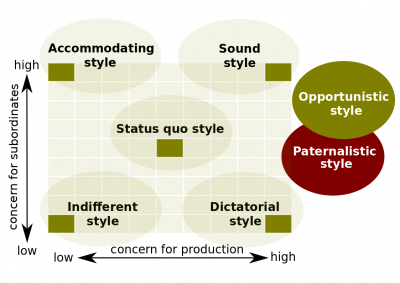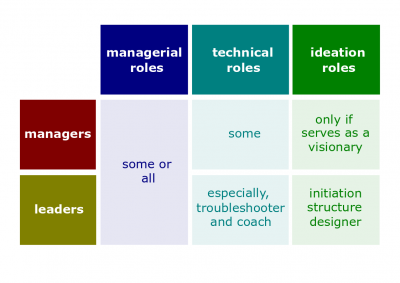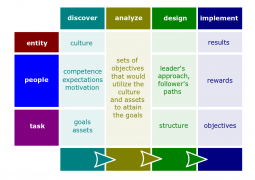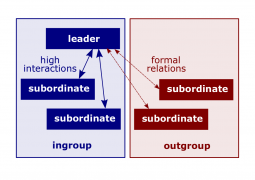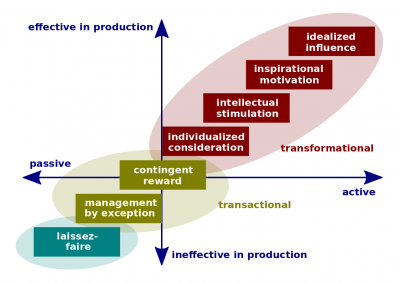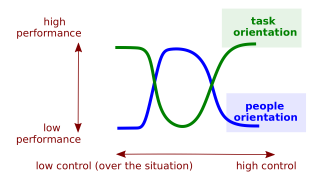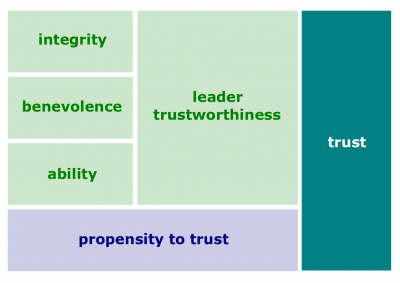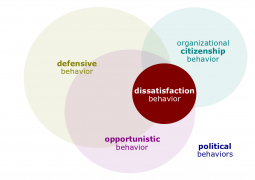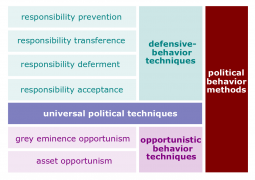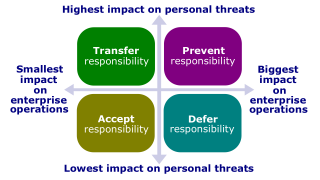OB leadership concepts
OB leadership concepts are those concepts that are related to leadership, power, and political skills researched in organizational behavior studies. The concepts below are taken from Organizational Behavior by Robbins and Judge (17th edition); Septem Artes Administrativi served as the primary source of illustrations.
Contents
Leadership
- Leadership. The ability to influence a group toward the achievement of a vision or set of goals.
Leadership in change
- Initiating structure. The extent to which a leader is likely to define and structure his or her role and those of subordinates in the search for goal attainment.
- Vision. A long-term strategy for attaining a goal or goals.
- Vision statement. A formal articulation of an organization's vision or mission.
- Transactional leader. A leader who guides or motivates his or her followers in the direction of established goals by clarifying role and task requirements.
- Transformational leader. A leader who inspires his or her followers to transcend their own self-interests and who is capable of having a profound and extraordinary effect on followers.
Features of leaders
- Consideration. The extent to which a leader is likely to have job relationships characterized by mutual trust, respect for subordinates' ideas, and regard for their feelings.
- Task structure. The degree to which job assignments are procedurized.
- Position power. Influence derived from one's formal structural position in the organization; includes power to hire, fire, discipline, promote, and give salary increases.
- Leader-member relations. The degree of confidence, trust, and respect subordinates have in their leader.
Theories of leadership
- Trait theory of leadership. One of theories that consider personal qualities and characteristics that differentiate leaders from nonleaders.
- Behavioral theories of leadership. One of theories proposing that specific behaviors differentiate leaders from nonleaders.
- Attribution theory of leadership. A leadership theory that says that leadership is merely an attribution that people make about other individuals.
- Charismatic leadership theory. A leadership theory that states that followers make attributions of heroic and extraordinary leadership abilities when they observe certain behaviors.
Leader-member relations
- Path-goal theory. A theory that states that it is the leader's job to assist followers in attaining their goals and to provide the necessary direction and/or support to ensure that their goals are compatible with the overall objectives of the group or organization.
- Leader-participation model. A leadership theory that provides a set of rules to determine the form and amount of participative decision making in different situations.
- Leader-member exchange theory. A theory that supports leaders' creation of ingroups and outgroups; subordinates with ingroup status will have higher performance ratings, less turnover, and greater job satisfaction.
Leadership styles
- Full Range Leadership Model. A model that depicts seven management styles on a continuum: laissez-faire, management by exception, contingent reward leadership, individualized consideration, intellectual stimulation, inspirational motivation, and idealized influence.
- Authentic leader. A leader who knows who he or she is, knows what he or she believes in and values, and acts on those values and beliefs openly and candidly. Their followers would consider them to be ethical people.
- Socialized charismatic leadership. A leadership concept that states that leaders convey values that are other-centered versus self-oriented and who role-model ethical conduct.
- Servant leadership. A leadership style marked by going beyond the leader's own self-interest and instead focusing on opportunities to help followers grow and develop.
Contingency models
- Fiedler contingency model. The theory that effective groups depend on a proper match between a leader's style of interacting with subordinates and the degree to which the situation gives control and influence to the leader.
- Least preferred coworker questionnaire. An instrument that purports to measure whether a person is task or relationship oriented.
- Situational leadership theory (Hersey-Blanchard Situational Leadership Theory). A contingency theory that focuses on followers' readiness.
- Mentor. A senior employee who sponsors and supports a less-experienced employee, called a protégé.
Trust
- Trust. A positive expectation that another will not act opportunistically.
- Trust propensity. How likely an employee is to trust a leader.
- Identification-based trust. Trust based on a mutual understanding of each other's intentions and appreciation of each other's wants and desires.
Leaderless models
- Leader substitute. An attribute or set of attributes, such as experience and training, that can replace the need for a leader's support or ability to create structure.
- Leader neutralizer. An attribute or set of attributes that make it impossible for leader behavior to make any difference to follower outcomes.
Power
- Power. A capacity that A has to influence the behavior of B so that B acts in accordance with A's wishes.
- Dependence. B's relationship to A when A possesses something that B requires.
- Coercive power. A power base that is dependent on fear of the negative effects from failing to comply.
- Reward power. Compliance achieve d based on the ability to distribute rewards that others view as valuable.
- Legitimate power. The power a person receives as a result of his or her position in the formal hierarchy of an organization.
- Expert power. Influence based on special skills or knowledge.
- Referent power. Influence based on identification with a person who has desirable resources or personal traits.
- Power tactic. A way in which individuals translate power bases into specific actions.
Politics
- Political skill. The ability to influence others in such a way as to enhance one's objectives.
- Sexual harassment. Any unwanted activity of a sexual nature that affects an individual's employment and creates a hostile work environment.
- Political behavior. Activities that are not required as part of a person's formal role in the organization but that influence, or attempt to influence, the distribution of advantages and disadvantages within the organization.
- Zero-sum approach. An approach that treats the reward "pie" as fixed, such as that any gains by one individual are at the expense of another.
- Defensive behavior. Reactive and protective behaviors to avoid action, blame, or change.
- Impression management. The process by which individuals attempt to control the impression others form of them.
